
NOVEMBER 2005
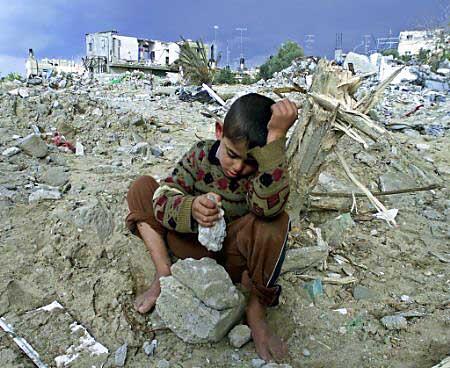
65th Letter of an Autonomous Thinker
I like Thomas S. Kuhn when he writes in “The
structure of scientific Revolutions”: “Led
by a new paradigm scientists adopt new instruments and
look in new places. Even more important, during
revolutions scientists see new and different things when
looking with familiar instruments in places they have
looked before”.
The
present political paradigm in the world (under the
leadership of the
Something fundamental different has to happen. The
present world leaders are even not 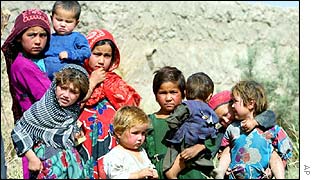 capable to give all children a
decent life.
capable to give all children a
decent life.
The report “Growing up in
“Nearly 600 million Asian children under the age of
18 lack access to either food, safe drinking water,
health or shelter. Of those, 350 million are described as
"absolutely poor", meaning they do not have
access to two or more of a child's essential
necessities”. Financial help is apparently not
helping fast enough.
How ever
can top-leaders take the decision that the number of
people that live on less than one dollar a day should
only be halved in 25 years?
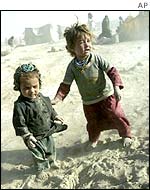 What about the other half? Why
can’t poverty be eradicated in 25 years? The UN
Millennium Development Goals are a shame for humanity
because they do not provide for all humans a decent life.
In 2015 more than a billion people will still live in
utmost poverty – and many millions of children
will have died because they can’t get the
necessary food that is elsewhere abundantly present.
What about the other half? Why
can’t poverty be eradicated in 25 years? The UN
Millennium Development Goals are a shame for humanity
because they do not provide for all humans a decent life.
In 2015 more than a billion people will still live in
utmost poverty – and many millions of children
will have died because they can’t get the
necessary food that is elsewhere abundantly present.
“Growing up in Asia” also states that
in the so-called dictatorial
By the way,
Only when leading people change their paradigm, change
their way in which they see the world, the inhuman
situation that millions of kids continue to be deprived
of a decent life can be solved.
Even sympathetic organisations as PLAN state that
“this scale of child poverty will have a 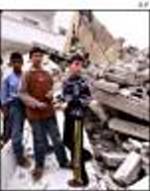 serious impact on
serious impact on
I don’t understand. The first point is not that
Good-willing people as the members of PLAN only try to
soften the most awful sides of our society while at the
same time they support the political paradigm that causes
the continuing presence of misery. People shall have to
adopt a new paradigm that sets living people over the
dead economy.
We need leaders with a mind that fundamentally differs
from the mind of present leaders. Leading people will
only change their paradigm on which they base their
decisions when they cannot anymore continue their life
in the isolated eliteworld where things are quite
different from the life in the massworld. Only then they
will put the interests of masspeople in first place, now
they first look at the situation in their own small, safe
and privileged eliteworld.
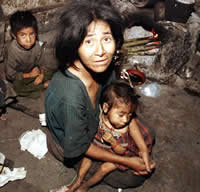 A new
political paradigm could be the goal to give now all
children access to food, safe drinking water, health and
shelter.
A new
political paradigm could be the goal to give now all
children access to food, safe drinking water, health and
shelter.
To impose this new paradigm I propose to invade the
eliteworld so that elitepeople cannot live anymore their
privileged life. Then masspeople will get so much
confidence that they can reach a new world in which all
people will have equal status (and children are never
again deprived of basic needs). Both kinds of people
will change their outlook of life, in the words of Kuhn
they will change their paradigm. Only then new things can
happen.
Yours truly, Joost van Steenis
http://members.chello.nl/jsteenis
New ways to increase masspower
the tear fund
jane's story,
from the internet
I worked in Africa with TEAR Fund,
and have also visited India. I came face to face with
poverty. In India the railway children really shocked me,
living in such awful slums.
www.request.org.uk
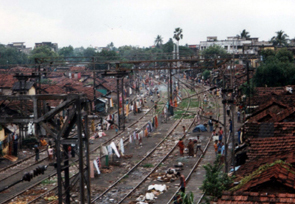
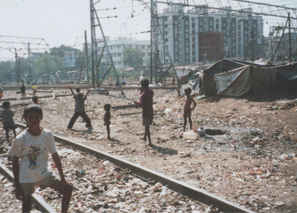
My first reactions to poverty were mixed and hard to pinpoint:
- Horror that human beings could live in such a state.
- Hope that in some way they were different and knew no better, so did not mind.
- Helplessness, that I could do nothing to change the situation.
- Felt like an outsider looking in, but not really comprehending all I saw.
- Guilt that by comparison I am so
rich.
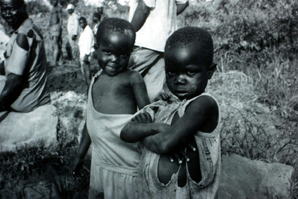
I wonder how you would react living with people who only had one good set of clothes that they wear with pride to church on Sundays? The rest of the week they wear a t-shirt with more holes than cloth and walk barefoot - not as a fashion statement - that's just all they have
People have no running water to their mud brick houses, and may have to walk a mile or so with a bucket to fetch river water - often it's the young girls who do this at 6 a.m. In my house in the U.K.I have 6 taps, several of you may have more in your house. In the hospital where I worked in Nigeria, we had one tap for the whole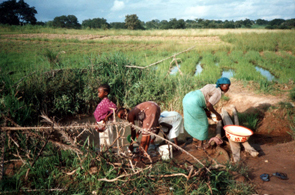 hospital;
a lorry bringing river water filled this tank. By
the time I left we had three taps from a mains
water supply for the hospital, but the water was
turned off many hours a day.
hospital;
a lorry bringing river water filled this tank. By
the time I left we had three taps from a mains
water supply for the hospital, but the water was
turned off many hours a day. I certainly felt quite guilty being part of the 'haves', living amongst the 'have-nots'. The statistics say one third of the world's population use up two thirds of the world's resources. The fact is you and I are part of that privileged third. It certainly is not fair, why do we have so much and they have so little? Do I have any responsibility towards others less well off? - What does Jesus say in The Bible, Luke chapter 10 verses 25 - 37?
What is poverty? It's not just a shortage of money. Poverty is a web of inter-related circumstances that leaves the person feeling trapped and helpless, unable to break out. Poverty is about people whose day-to-day struggle to survive leaves them with no energy, people who are voiceless in society, and who lack power to make choices and so change their circumstances.
I often felt frustrated that I was not able to do more to help. I would love to rush in with a magic wand and make their life easier. But would them having a Father Christmas figure really help them and their self-respect and dignity as children made in the image of God? TEAR Fund's motto is "Christian action WITH the world's poor", and that's what I had come to do - to work with Nigerians to empower and enable them to help themselves and their community.
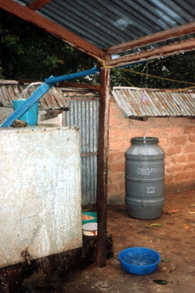 In the wet season I had a system that
collected rainwater off the roof of my house into
a tank. If I was sparing with this I could get
through a large part of the dry season without
having to collect water from the river. A good
system, but what would I do if someone knocked on
the door to ask for a drink of water? Easy. The
Bible says give it to them. But what about 20
students each coming for a bucket of water - what
would you do?
In the wet season I had a system that
collected rainwater off the roof of my house into
a tank. If I was sparing with this I could get
through a large part of the dry season without
having to collect water from the river. A good
system, but what would I do if someone knocked on
the door to ask for a drink of water? Easy. The
Bible says give it to them. But what about 20
students each coming for a bucket of water - what
would you do?I survived the isolation and poor living conditions by going every 6 weeks for a two hour drive to the capital. I would visit the swimming pool at the Sheraton Hotel, where there were wonderful hot water showers, and beautiful relaxing surroundings. But I lived with people who may never have been to the capital - was it wrong for me to go?
Poverty is about lack of choice. Having come home I found the scope of choices that faced me each day overwhelming. I remember going to Boots to buy a toothbrush and coming away without one. Did I want nylon or bristles? Hard, medium or soft? What shape did I want? What colour?
I learnt that what people valued was to have time to listen and care for each other. I may be rich materially but what about the time I have for other people? I learnt how much people valued time spent with them to bring their concerns and needs to God in prayer, a God who did literally give them their daily bread. In the Bible Jesus reached out and touched the man with Leprosy (Luke chapter 5 verse 13). He got involved. Africans are so thankful for the little they have, saying grace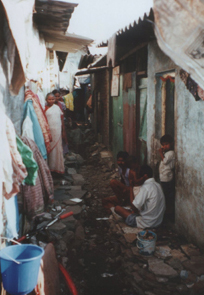 before meals to thank God for his care.
But in England, where we have so much, do we ever
stop in the rush of each day to thank God for all
he has given us?
before meals to thank God for his care.
But in England, where we have so much, do we ever
stop in the rush of each day to thank God for all
he has given us?How can I help give a voice to the voiceless? How can I help give people the tools and skills to be able to change their situation? How can I enable local Christians to reach out in Jesus' name and tell the poor they are not forgotten, they are loved and precious to God?
Can I encourage you to contact a charity organisation and get involved by prayer, by giving, by advocacy, by going?
"There will always be some among you who are poor. That is why I am commanding you to share your resources freely with the poor."
The Bible, Deuteronomy,Chapt.15 Verse 11.